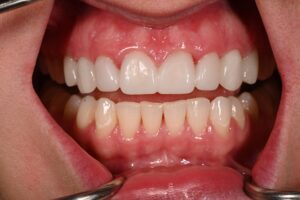How Long Do Dental Implants Last?

Dental implants replace one, a few, or a whole row of teeth.
These tooth implants are considered one of the safest procedures with a high success rate.
As a result:
You’ll get your best smile back, be able to eat what you like, and speak with confidence.
But will dental implants last? Find out:
- What makes them an excellent lifetime investment
- What types of tooth restorations you can enjoy
- How to help make your implant process a success
How long do teeth implants last?
Do dental implants last forever? Well, with the right starting conditions and good oral hygiene, you could have a 95% chance or better of your dental implants staying with you for the rest of your life.
Why do they last that long? For two reasons:
- The method of implantation
- Implant material
1. The dental implant procedure
Your implant family dentist will carefully plan the best site for your dental implant.
They’ll pick the part of your jawbone that has the proper density and location. In fact, if there’s not enough bone, your dentist may suggest a bone graft.
Once the implant is placed in the bone, it’ll take a few months for the implant post to bond with your jawbone.
This is a well-studied process called osseointegration—the implant is integrated with your natural jawbone, becoming a part of your jaw and acting as a tooth root.
2. The implant material
Most implants are made of titanium, which is a very strong metal that’s compatible with the human body.
This material has been studied thoroughly, so the chance of it recovering successfully is very high.
Keep in mind that each titanium implant is basically a tooth root or support for an appliance.
That means a porcelain dental crown could be attached to it—or a bridge or dentures. And those appliances don’t always last a lifetime, of course, because they naturally wear down from daily chewing.
But the supporting implant is always there.
What are the different types of dental implants?
Besides standard titanium, other materials are available, which you can discuss with your implant dentist.
They’re not usually necessary, but your surgeon can recommend other materials if they would help.
At Smile Connections, we offer:
- Single tooth restorations: Each of these is a single dental crown that replaces a tooth.
- All-on-X: Also known as All-on-4, this is a technique that replaces an entire arch of teeth with a permanent denture attached to a minimum of 4 implants (although it can be attached to more).
Can dental implants fail?
Almost every procedure in medicine has some chance of failure.
But:
Dental implants have a 95-98% success rate.
If an implant does fail, it could involve reasons, such as:
- Gum disease: A gum infection can damage the gums that hold teeth and implants in place, as well as the jaw bone.
- Smoking: Continuing to smoke immediately before and after the surgery can increase failure rates by around 20%.
- A lack of jaw bone: If there’s not enough jaw bone present—or a patient loses bone mass from osteoporosis—it won’t hold the implant in place.
- Poor oral hygiene: Poor brushing and flossing habits can lower the implant success rate.
- Medical issues: Conditions that slow down healing can prevent an implant from being integrated with the jaw.
Dr. Volker and the implant surgeon should discuss each of these risk factors with you before the implantation to make your surgery and recovery more successful.
Do you need dental implants near Wichita, KS?
Using comprehensive dentistry, your team at Smile Connections Family Dental will coordinate the whole process with a trusted implant surgeon, craft your replacement tooth or teeth, put the appliance in place, and make sure you’re happy with your smile.
If you’re in the Wichita area, schedule a free implant consultation with us.
Or contact us by:
- Phone: 316-722-8148
- Email: info@smileconnectionsdental.com
We serve Wichita… opens in a new window to Google Maps…, Eastborough, Oaklawn-Sunview, Maize, Bel Aire, Park City, Goddard, Andale, Colwich, Clearwater, and Andover, KS.

